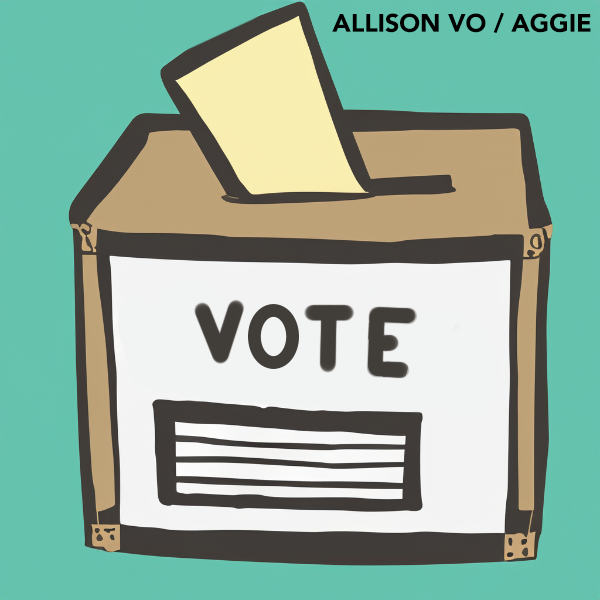The bill aims to make rules regarding ASUCD campaign financing more clear and efficient to increase voter turnout
By RIVERS STOUT — campus@theaggie.com
On Feb. 22, the ASUCD Senate amended and passed SB #55 after a lengthy debate between the senators. The bill was authored by Zachary Boggeln, the vice chairperson of the Internal Affairs Commission (IAC) to ensure that elections are “more transparent, equitable and efficient,” according to the language of the bill.
The goal of the bill is to make elections more fair for running candidates who don’t have connections willing to give them significant donations.
“I [have] served on the elections committee for a year now,” Boggeln said. “I’ve also been one of four committee members to assess violation reports where fraud is suspected [in ASUCD elections], or if there is any reason to believe that any candidate or campaign at any point violated the rules that the association has set for a campaign.”
Boggeln described multiple reasons for the bill’s writing, including difficulties investigating possible instances of expenditure fraud or poor finance management in running senators’ campaigns.
“The trouble was, and still is, that the expenditure reports are due immediately after the voting cycle has ended [on Friday night],” Boggeln said. “The elections committee has until Sunday at midnight to release the results.”
Within that two-day period, the committee has to go through all campaign expenditure forms and ensure that the campaigns followed the guidelines placed. This can be a tedious process, and to investigate an election with suspicious expenditures can be time consuming.
“There was a problem with one campaign in which we couldn’t identify the source of the materials that were donated,” Boggeln said. “SB #55 was written to make that process easier for the elections committee to investigate.”
Boggeln went on to explain that the ambiguously constructed rules around campaign finance were hard to interpret and effectively act on. His bill was ultimately a way to make the rules more concise, allowing for better action to be taken when expenditure fraud is suspected, while hopefully making it more difficult and less likely to be committed in the first place.
When it was to be voted on, the bill created a controversy in the Senate. With much of the Senate already gone, a few senators debated at length about the bill’s content with the morality of material donations and how they can create an uneven playing field. The bill originally banned all material donations out of fairness in the elections and ease for the IAC, however, the majority of the remaining senators eventually decided to allow material donations provided by students under $10, with receipts included.
“I liked it as it stood,” Senator Curtis Chen said. “I was surprised that it was a contentious bill because in my opinion, everybody is on the same playing field. When I ran, I didn’t spend any money besides the poster paper, and I feel like I had a pretty successful cycle. It was a good regulation on the election process and I’m glad that it passed.”
Chen then spoke on the benefit of the bill limiting donations and how it will likely have a positive impact on the elections.
“Having a monetary advantage on other candidates is just unfair,” Chen said. “It’s more similar to how the U.S. [elections] are, but we’re students, [and] I don’t think we should be winning based on how much money we put into elections. We should be winning based on our ideals and the communities we represent.”
Chen expressed that he was satisfied with the bill passing, regardless of the amendments made to it.
Reported suspicions of campaign finance fraud or other violations come from student voters, according to Boggeln. However, voter turnout in the last few years has been low, with the fall 2023 election cycle hitting just below 16%. It is difficult for the IAC to investigate cases of potential fraud with low turnouts.
“Voter turnout is one of the things I wish to improve this cycle,” the newly elected ASUCD Elections Officer Sriya Batchu said. “My goal is more advertising. [The goal is to] get the word out there to different parts of campus that might not be as aware of elections and may not have much overlap with ASUCD in general.”
Batchu hopes to increase turnout by putting posters up around campus, increasing the online presence of the elections, utilizing raffles to increase awareness, tabling and asking that ASUCD events promote the elections.
“We’re trying to target freshmen, because I know that from when I was a freshman, they don’t know much about ASUCD,” Batchu said. “While I’m sure many of them are somewhat aware, they maybe don’t have one-on-one interaction.”
When asked if the Elections Committee would employ any new tactics to increase engagement, Batchu said that they are going to expand on the strategies they have already used.
“Every election has been a little bit better than the previous one, in my opinion,” Batchu said. “ I’m hoping that in this cycle we can focus on more advertising and getting out there more.”
While the IAC has existed for a long time, Batchu’s position of elections officer was recently created. Until now, it had been primarily focused on organizing the logistics of elections and didn’t prioritize increasing the election’s voter turnout.
SB #55 was ultimately an effort to make the elections more grassroots and make the ASUCD Senate a better democracy, according to Boggeln.
“I think this bill is great not because it asks people to look for big donors, [but to] look for voting students and convince them that not only should they vote for them, but they should give them 10 dollars to vote for them,” Boggeln said. “I think that will incentivize candidates to work really hard to craft a platform to appeal to students that’s meaningful, and also provide an opportunity for really qualified candidates to run a campaign.”
Written by: Rivers Stout — campus@theaggie.org




